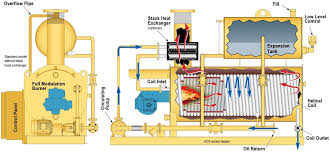
दिसम्बर . 06, 2024 07:17 Back to list
What Is the Temperature of Water in a Boiler System?
How Hot is Boiler Water?
Boilers play an essential role in heating systems across various applications, from industrial processes to residential heating. Understanding how hot boiler water can get is critical for ensuring safety, efficiency, and optimal performance. This article will explore the typical temperatures of boiler water, factors influencing these temperatures, and the importance of monitoring boiler water temperature.
Typical Boiler Water Temperatures
Boiler water temperatures can vary significantly depending on the type of boiler, its purpose, and the parameters set for its operation. Generally, residential boilers tend to operate at lower temperatures compared to industrial boilers.
1. Residential Boilers Residential boilers typically operate at water temperatures between 140°F (60°C) and 180°F (82°C). These temperatures are sufficient for most heating applications, including radiators and underfloor heating systems. Some high-efficiency condensing boilers can operate at lower temperatures, around 120°F (49°C), to maximize energy efficiency by reclaiming heat from exhaust gases.
2. Commercial Boilers Commercial boilers usually operate within a range of 180°F (82°C) to 220°F (104°C). These boilers are designed to meet greater heating demands and are often customized to specific applications, such as providing steam for culinary or industrial operations.
3. Industrial Boilers Industrial boilers can reach much higher temperatures, often operating above 300°F (149°C) and sometimes exceeding 400°F (204°C) or more. These high-temperature systems are employed in power generation, chemical processing, and heavy manufacturing, where steam under high pressure is required.
Factors Influencing Boiler Water Temperature
Several factors can influence the temperature of boiler water, including
1. Boiler Type The design and type of boiler fundamentally determine operational temperature ranges. For instance, fire-tube and water-tube boilers have different heat transfer mechanisms, affecting their maximum operational temperatures.
how hot is boiler water

2. Pressure Settings The temperature of boiling water is directly related to the pressure within the boiler system. As pressure increases, the boiling point of water also rises, allowing for higher temperatures. This is why high-pressure boilers can extract more energy and generate steam at temperatures significantly above 212°F (100°C).
3. System Design The overall design of the heating system—including pipe sizes, insulation, and heat exchangers—can affect how heat is distributed and maintained throughout a building or process.
4. Control Systems Modern boilers often feature sophisticated control systems that monitor and adjust temperatures for efficiency and safety. These systems can respond to fluctuating demands and environmental conditions, optimizing performance.
Importance of Monitoring Boiler Water Temperature
Maintaining the appropriate boiler water temperature is critical for several reasons
1. Safety High temperatures can lead to dangerous situations, including pressure ruptures or thermal expansion issues. Boiler operators must be vigilant in monitoring temperature to prevent overheating, which can result in equipment failure and unsafe operating conditions.
2. Efficiency Operating a boiler at the correct temperature ensures that it functions efficiently. Too low of a temperature can cause condensation and reduced heat transfer efficiency, while excessively high temperatures can waste fuel and lead to mechanical stresses.
3. Longevity Maintaining optimal operating temperatures can extend the life of the boiler and its components. Frequent temperature fluctuations can cause wear and tear, leading to costly repairs and downtime.
Conclusion
In conclusion, the temperature of boiler water is a critical factor that affects safety, efficiency, and performance. Understanding the typical operating ranges for different types of boilers, the factors that influence temperature, and the importance of monitoring can help ensure that heating systems operate smoothly and reliably. Whether you are operating a residential boiler or a large industrial system, ensuring that water temperatures remain within safe and efficient limits is paramount for optimal operation.
-
Commercial Steam Boilers for Sale - AI Optimized Efficiency
NewsAug.02,2025
-
Efficient Biomass Fired Hot Water Boiler | AI Heating Solution
NewsAug.01,2025
-
High-Efficiency Gas Thermal Oil Boilers | HPT Models
NewsJul.31,2025
-
Oil Fired Hot Water Boilers Sale - High Efficiency & Affordable
NewsJul.31,2025
-
High-Efficiency Commercial Oil Fired Steam Boiler for Industry
NewsJul.30,2025
-
High-Efficiency Biomass Fired Thermal Oil Boiler Solutions
NewsJul.30,2025
Related PRODUCTS






















